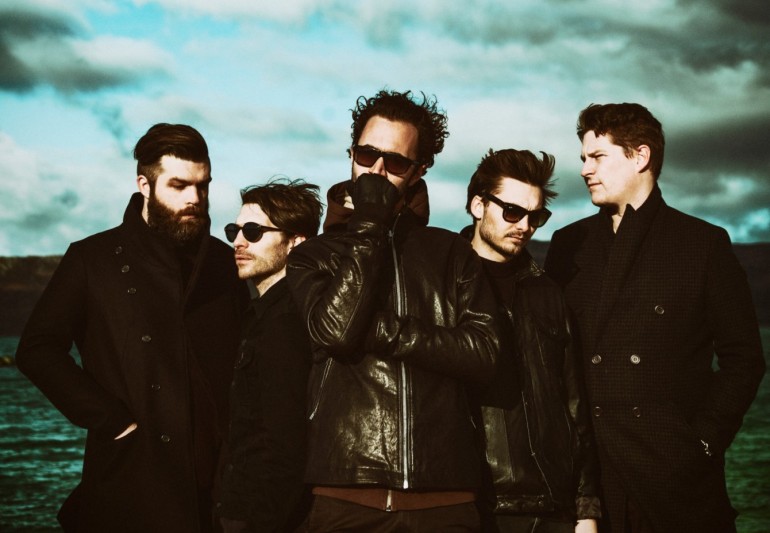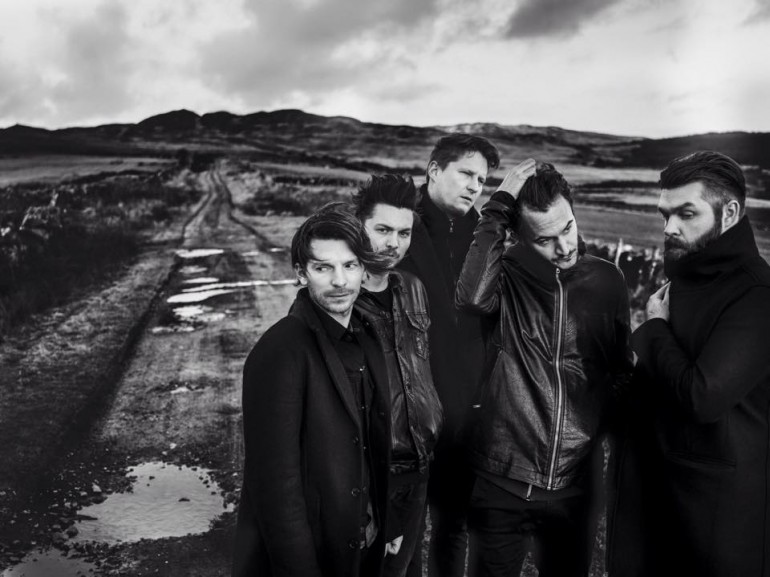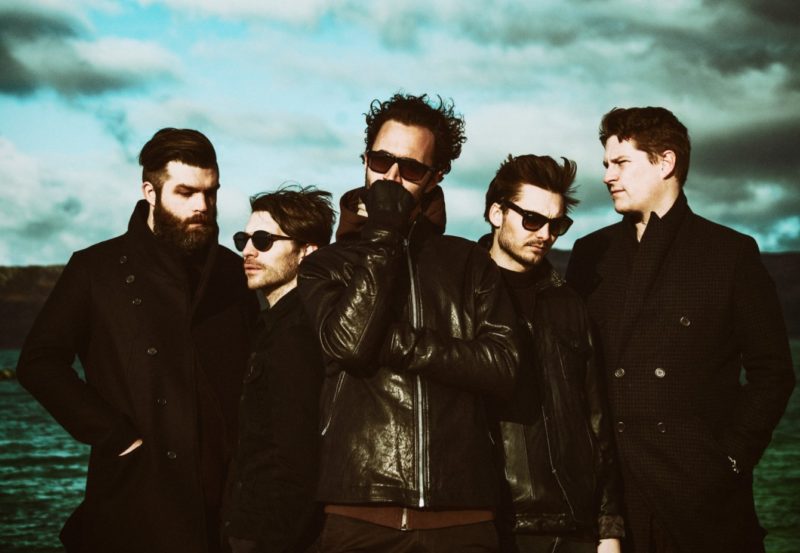
Photo by Rahi Rezvani
Sometimes things can happen surprisingly quick when all elements line-up perfectly. Less than two years after the release of their fourth album The Weight of Your Love British wave rockers EDITORS headed back to the studio to record its follow-up. And after only a few months the work on In Dream was done, far quicker than anyone in the band intended. NOTHING BUT HOPE AND PASSION already listened to the new album and got the impression that Tom Smith and his boys created the band’s most cohesive release so far. While the predecessor still heavily suffered from the departure of Chris Urbanowicz and the two new members Justin Lockey and Eliott Williams trying to fit in the group, this one feels different.
On one side In Dream feels like the fresh start its predecessor didn’t offer. On the other side, it also feels like the logical continuation of 2009’s In This Light And On This Evening. Time to sit down with Tom and Russell to clear up any unclarity regarding the new EDITORS. Read our brief talk with the two gentlemen below.
Truth be told… how much do you regret The Weight Of Your Love by now?
Tom Smith: I don’t regret it all. We went through a lot with Chris and him leaving the band which was very scary for us. Although we instantly got on very well with the two new people coming in, there was always this backdrop of tragedy that had happened. It was very strange for them to step into Chris’ shoes and strange for us to have new people around as well. We were all just like, well if we’re going to be a band, can we do this?
In our kind of understanding of what we were doing, it was very important for us to make a very traditional sounding record, a straight rock record that felt like a band record. It was like taking stock and making sure the band was going to be okay. I see this record as the kind of logical progression to our third album. Because it was a new line up for the band, we first had to be a band. There’s still songs on the album like Sugar, A Ton Of Love, Formaldehyde or The Phone Book that I adore. I don’t regret it at all. It’s a transitional record.
Does it feel like this settling-in period is over for good now that you’ve made another record together?
TS: Absolutely. There was no backdrop of worries or anxiety anymore. There was a change of sound, but we’ve been on tour, we like each other and when we had the new songs, we just wanted to make another record.
So basically, it was almost like a social experiment with all of you recording in a room together.
Russell Leetch: It wasn’t intended to be self-produced. We went up to Scotland to demo the songs. We had a few songs that were ready to get mixed so we sent them to Alan Moulder and when they came back, we were really happy with them. For the next session we thought, well this is going to be the record. There was never the intention of self-producing the record. In fact, we were talking about producers and people who could get involved that were on our radar.
TS: If we’d told ourselves beforehand we’d be going to Scotland to self-produce our record, we would have been worried about it. Instead, we just went there to see what happens.
‘We just wanted to go some place where we could concentrate on making music’
Usually bands are looking for some guidance to avoid being in the studio for too long. It seems, you’re very disciplined.
TS: I think so. We all have kind of different roles so it was a very shared creative responsibility. Justin was the one who worked the computer for the most part, but other than that, he would come down in his dressing gown midday and off we would go for 12 hours. It wasn’t really a social experiment.
Do you question yourselves more or less as a band when there’s no producer around?
TS: Maybe, we question ourselves a bit more because when you have a producer around you put the responsibility on his or her shoulders. There wasn’t that person around this time. We were okay when we had five people saying yes. Of course, there was a bit more pressure on us in this respect and no-one there to crack the whip. I guess that person was probably me, but it didn’t feel like I was the one to decide what we would do.
This time it feels like a far more cohesive album from start to finish. Surprisingly, the first two tracks you released were the opening and the closing song. Did you do that intentionally?
TS: These two songs are a bit more experimental for us and we felt it was important to show people that.
RL: With the previous album, we released A Ton Of Love as the first single which is a very straight forward guitar track. If we had introduced the record with putting out Sugar first, maybe people’s feelings would have been different. I don’t think much about things like that, but you do want people to find out more about a record.
TS: You want to engage your fanbase. Quite a lot of the time, they like the more kind of out there moments. It was fun for us to get the songs out a bit different this time.
The concept of dreaming is visible throughout the whole album. What made you choose this theme?
TS: It kind of picked me like it often does. With the last album, the songs were more about love in a certain way. After four or five songs into the album I realized that I mentioned dreaming or waking up. It just naturally came out in the lyrics. There was no pre-thought concept. Musically, I also think the record has a blurry, dreamlike quality to it. When we were recording and looking out over the mountains, it was just stunning.
Isn’t that also why this place is so popular with weddings in Scotland?
RL: That’s true! It was set up as a retreat for classical pianists and more classic music in general, but it’s hard for the person who runs it to make a living out of that. We just wanted to go some place where we could concentrate on making music for a period of time rather than doing it it from 9 to 5 so we could work more intensely. The surrounding was just beautiful. Previously, we’ve been in Birmingham which is not in a very beautiful surrounding. This time, we were opposite a mountain and the ocean.

Photo by Rahi Rezvani
According to you, Tom, you wanted to make ‘a real studio record’ this time. What did you have in mind when you went into the studio?
TS: The last record was so heavily weighted on being a band and playing the songs which was important for us a group, but having done that I think we wanted to focus on the more electronic aspects again. We do like synthesizers and the electronic element in our music. We felt like we could remove that stage of playing in a room together. The development of the demo should just be on the computer. We wanted to work on the songs that way rather than playing them traditionally. Just because we wanted to do it differently than last time.
There is a visual concept for the album as well. You were working together with Rahi Rezvani for example. How did the idea come about to leave all the visual aspects up to him?
RL: We had been looking for someone like him for quite a while. Basically, we saw some of his work and thought it was great. We loved his natural style and the mood he created so we let him do the videos, the pictures and all of the artwork.
TS: When it comes to visuals, it’s quite often a frustrating process. You work with different directors on the videos and prior to that a lot of ideas come in. Sometimes you don’t necessarily feel a connection with them. With this album, Rahi came over just taking a few pictures of me to start with. Then he came and shot the band at a gig. Afterwards, we suggested the idea for him to oversee everything on this record. We gave it to him, he loved it and he wanted to do it.
‘It’s nice to have something so cohesive as well.’
RL: I like that the pictures and everything else is all done by the same person.
Looking ahead, you’ve recorded a duet with Rachel Goswell from SLOWDIVE for the first time in your career. What was the reason for you waiting so long to do something like that?
TS: We talked about getting a female singer on the record for a while so we asked some people, but some of the things didn’t work out. We had seen SLOWDIVE playing a couple of times and we had heard that Rachel was a big fan. It wasn’t like I had written songs as a duet. We simply asked her to hang out with us for a couple of days and see what happens. Obviously, The Law is closest to a duet and she sings backing vocals on a few more songs. It was nice to have her around.
You recently celebrated your 10-year anniversary with The Back Room. What is your relationship like with it today?
TS: The Back Room was a very important record for us. Possibly for some fans, it’s a defining record, but in different parts of the world different records are more important than others. Certainly, the album came out at a very unique time. That period was very exciting. Part of me thinks, it feels like it’s been ten years, part of me thinks, where did these ten years go? I don’t get too nostalgic about it because we’re constantly doing something new. However, it’s humbling to hear all this outpouring lately from people talking about how much this record means to them.
—



